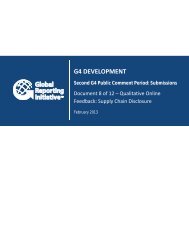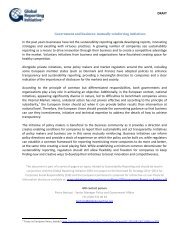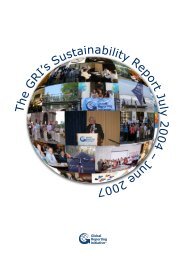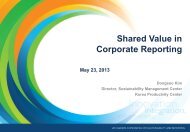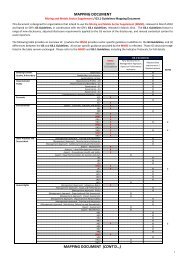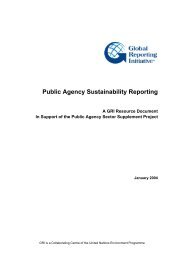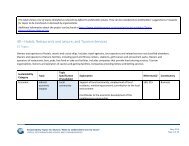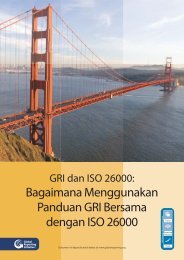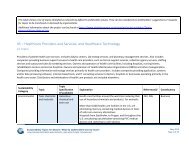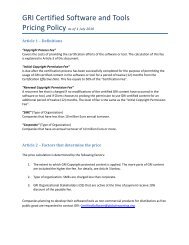CARROTS AND STICKS – PROMOTING ... - Global Reporting Initiative
CARROTS AND STICKS – PROMOTING ... - Global Reporting Initiative
CARROTS AND STICKS – PROMOTING ... - Global Reporting Initiative
Create successful ePaper yourself
Turn your PDF publications into a flip-book with our unique Google optimized e-Paper software.
Emerging trends at the global<br />
level<br />
Over the past four years the use of international<br />
standards has increased substantially.<br />
Proliferation of Standards and Coherence.<br />
There has been a proliferation of standards at the<br />
global and the national level. Indeed, in an increasingly<br />
globalised and complex world, international standards,<br />
codes and guidelines addressing sustainability reporting<br />
are continually evolving. This wealth of standards is a<br />
sign of an increasingly diverse and mature international<br />
framework for sustainability reporting. However, there is<br />
one risk: that the challenges of overlapping, conflicting,<br />
and sometimes even competing standards may arise.<br />
There is also a need to promote synergies between<br />
the different initiatives, to enhance coherence and<br />
convergence. Research conducted for this report has<br />
revealed that at the global level some of the initiatives<br />
identified have <strong>–</strong> as a first step <strong>–</strong> started to cooperate<br />
to ensure coherence among the increasingly confusing<br />
multitude of standards.<br />
<strong>Initiative</strong>s rooted in International<br />
Organisations<br />
• UN <strong>Global</strong> Compact Principles<br />
• OECD MNE Guidelines<br />
• UNPRI<br />
Multistakeholder and Private Frameworks<br />
• GRI G3 Guidelines<br />
• ISO 26 000<br />
• CERES Principles<br />
• SA 8000<br />
• AA1000APS<br />
• GHG - WRI/WBSCD<br />
• CDP<br />
Table 4: International <strong>Initiative</strong>s with reporting relevance<br />
Among all the international standards identified at the<br />
global level, the GRI G3 Guidelines are generally accepted<br />
as the most comprehensive guidance on sustainability<br />
reporting as a tool for measurement and communication<br />
(UNEP and KPMG, 2006; KPMG, 2008; ‘the gold standard<br />
for sustainability reporting’, see Richardson, 2008; ‘The<br />
GRI Guidelines have become the de facto standard for<br />
sustainability reporting, see Ceres, 2010).<br />
GRI offers a Sustainability <strong>Reporting</strong> Framework that<br />
ultimately aims to consolidate reporting against all the<br />
Carrots and Sticks - Promoting Transparency and Sustainability<br />
widely used normative sustainability and CSR principle<br />
frameworks.<br />
Some of the international voluntary instruments identified<br />
provide a normative framework and address sustainability<br />
reporting only indirectly in the sense that they promote<br />
or encourage reporting, and some refer to the GRI G3<br />
Guidelines. Examples are the United Nations <strong>Global</strong><br />
Compact Principles, the United Nations Principles for<br />
Responsible Investment and the Carbon Disclosure<br />
Project:<br />
• The signatories of the United Nations Principles for<br />
Responsible Investment commit to seek appropriate<br />
disclosure on ESG issues by the entities in which<br />
they invest, and principle 3 mentions the use of<br />
the <strong>Global</strong> <strong>Reporting</strong> <strong>Initiative</strong>’s Guidelines for<br />
standardised reporting.<br />
• In 2007 a linkage document showing how to use<br />
GRIs G3 <strong>Reporting</strong> Guidelines for the UN <strong>Global</strong><br />
Compact’s Communication on Progress was<br />
published by the two organisations. Under the UN<br />
<strong>Global</strong> Compact’s COP Policy, participants are now<br />
encouraged to use the GRI sustainability reporting<br />
framework to produce a COP (see COP Policy as of 3<br />
April 2009, para. 2.2.).<br />
• The OECD Guidelines for Multinational Enterprises<br />
encourage “timely, regular, reliable and relevant<br />
disclosure on financial and non-financial performance,<br />
including environmental and social issues” (see<br />
III. Disclosure). They explicitly encourage social,<br />
environmental, and risk reporting and the use of high<br />
quality standards for disclosure, accounting, and audit<br />
(OECD MNE Guidelines, commentary on disclosure,<br />
para. 14 and 15). In December 2009 the OECD<br />
initiated a process of review of the OECD Guidelines<br />
for Multinational Enterprises. GRI has been formally<br />
invited to contribute to the disclosure dimension of<br />
the revision.<br />
• Similarly, Draft ISO 26 000 provides guidance on<br />
the social responsibilities of business and other<br />
organisations. It is a management standard; not a<br />
reporting standard. It does however recognise that<br />
being socially responsible includes reporting on social<br />
responsibility performance (ISO/DIS 26000, ISO/TMB/<br />
WG SR N 172, see p. 75, Box 15). GRI has issued<br />
a linkage document explaining the linkage between<br />
ISO 26000 and G3.<br />
Focus: climate change <strong>–</strong> theme-specific standards for<br />
sustainability reporting on the rise<br />
Part of the increasingly mature regulatory framework<br />
for sustainability reporting is a focus on specific topical<br />
themes, for example climate change and human rights.<br />
John Ruggie, the Special Representative of the Secretary-<br />
General on the issue of human rights and transnational<br />
corporations and other business enterprises, for example<br />
15





